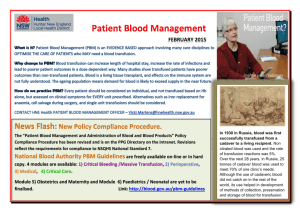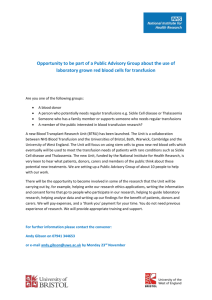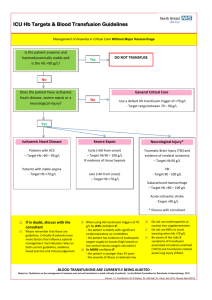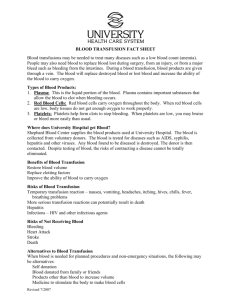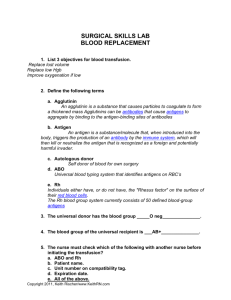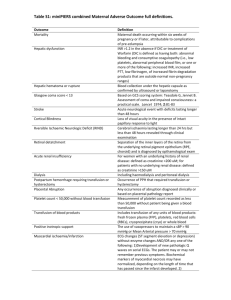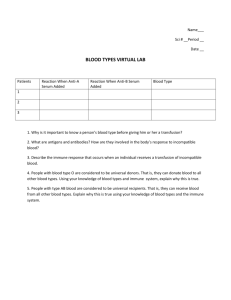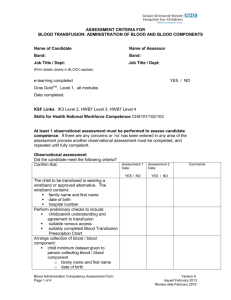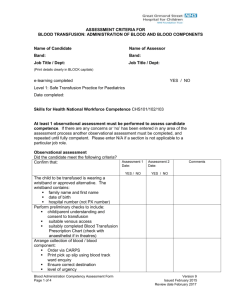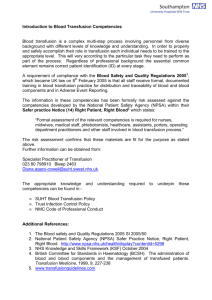preparing and administering a transfusion of blood/blood products
advertisement
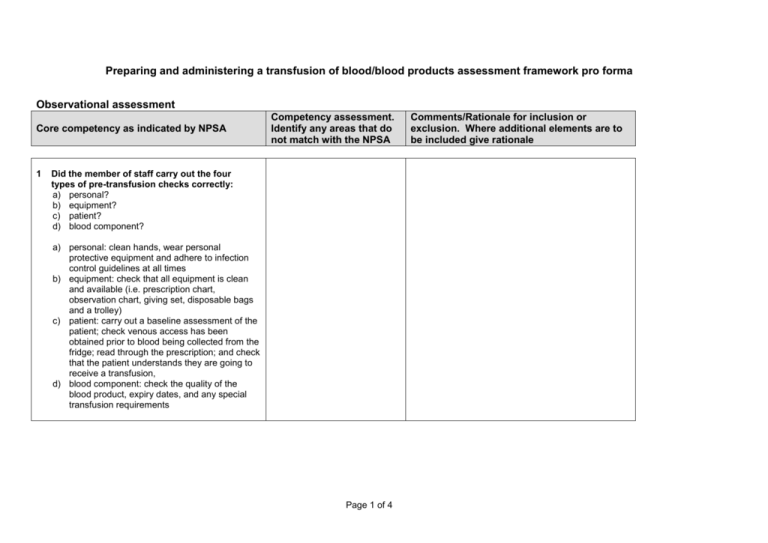
Preparing and administering a transfusion of blood/blood products assessment framework pro forma Observational assessment Core competency as indicated by NPSA 1 Competency assessment. Identify any areas that do not match with the NPSA Did the member of staff carry out the four types of pre-transfusion checks correctly: a) personal? b) equipment? c) patient? d) blood component? a) personal: clean hands, wear personal protective equipment and adhere to infection control guidelines at all times b) equipment: check that all equipment is clean and available (i.e. prescription chart, observation chart, giving set, disposable bags and a trolley) c) patient: carry out a baseline assessment of the patient; check venous access has been obtained prior to blood being collected from the fridge; read through the prescription; and check that the patient understands they are going to receive a transfusion, d) blood component: check the quality of the blood product, expiry dates, and any special transfusion requirements Page 1 of 4 Comments/Rationale for inclusion or exclusion. Where additional elements are to be included give rationale 2 Patient identification for the conscious patient Did the member of staff ask the patient to state their: a) full name? b) date of birth? Did the member of staff check: c) the details on the wristband or other attached identifier were correct? 3 Patient identification for unconscious patients or patients unable to verbally respond: Did the member of staff check: a) the details on the wristband or other attached identifier and at least their: full name? date of birth? hospital number? b) the information on the blood or blood product against the patient and wristband details? 4 Did the member of staff record the patient’s vital signs? a) blood pressure? b) temperature? c) pulse rate? Page 2 of 4 5 Administering the blood transfusion Did the member of staff ensure that the blood transfusion was: a) completed within four hours of it leaving the fridge, OR b) within 30 minutes for platelets? Did the member of staff c) record the patient’s vital signs prior to starting the transfusion? d) monitor the patient’s vital signs 15 minutes after starting the transfusion? e) dispose of equipment safely? f) monitor the patient’s vital signs on completion of the blood transfusion? 6 Documentation Did the member of staff record the following information in the patient’s notes: a) date? b) start time? c) stop time of the transfusion? Did the member of staff: d) complete the traceability documentation in accordance with national law? All of the above must be achieved to pass the assessment Page 3 of 4 Knowledge assessment Does the member of staff know and understand the importance of: Knowledge assessment required by NPSA Knowledge assessment Identify any areas that do not match with the NPSA using open-ended questions for patient identification? the timescales for administering blood and/or blood product safely after it had been collected from the fridge? correct procedure if unconscious patient or unable to give verbal identification? the risks associated with checking the blood compatibility form against the blood product instead of the information on the wristband? monitoring the patient’s vital signs throughout the transfusion process? Page 4 of 4 Comments/Rationale for either inclusion or exclusion
